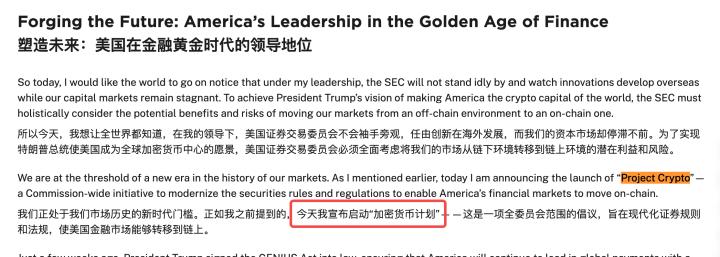Author: TPan
Translated by: Felix, PANews
The Chairman of the U.S. Securities and Exchange Commission (SEC) today launched the "Project Crypto" initiative, aimed at supporting cryptocurrency innovation in the United States. Although there were previous indications (such as: ETP physical redemption, reduced lawsuits and investigations against numerous institutions like Binance, Coinbase, Crypto.com, Immutable, Yuga, Kraken, Gemini, ConsenSys, OpenSea, Uniswap), this move not only reverses the damage caused in the past few years but also lays a solid foundation for the next phase of development in the U.S. cryptocurrency sector.
Frankly, when reading Chairman Paul Atkins' speech manuscript, I personally have not yet recovered psychologically from the SEC's attitude of suppressing the crypto industry in recent years.
Below is a summary of key points shared by Amal from Dragonfly, and the following text will elaborate on some of these points and their potential impacts.
Overview of SEC's "Project Crypto":
- Most crypto assets are not securities
- SEC will establish rules to clearly define when crypto assets constitute securities
- SEC will stop penalizing early centralized or traditionally structured token issuers
- An upcoming regulatory framework to support tokenized securities like stock and bond tokens within the U.S.
- Due to regulatory uncertainty, Americans will no longer be excluded from airdrops, ICOs, or network rewards
- SEC will protect self-custody rights of crypto assets and update custodial rules for registered companies
- DeFi protocols and Automated Market Makers (AMM) will be allowed to operate without mandatory intermediaries
- SEC plans to launch a super app integrating crypto trading, staking, lending, and securities on one platform
- A new "innovation exemption" will allow crypto projects to enter the market without fully complying with traditional regulations
- SEC will consider crypto developers as code publishers rather than intermediaries when appropriate
- The goal is to encourage crypto companies that fled due to previous government's mandatory regulations to return








